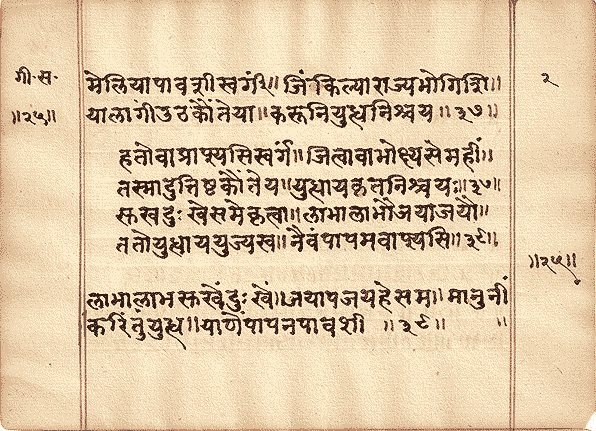
hato vā prāpsyasi svargaṃ jitvā vā bhokṣyase mahīm
tasmād uttiṣṭha kaunteya yuddhāya kṛta-niścayaḥ
Update RequiredTo play the media you will need to either update your browser to a recent version or update your Flash plugin.
he kaunteya (O son of Kuntī!),
[
tvam yuddhe]
(you in battle) hataḥ vā (or killed) svargam (heaven) prāpsyasi (you will obtain).
[
śatrūn]
(enemies) jitvā vā (or after conquering) mahīm (the earth) bhokṣyase (you will enjoy).
tasmāt (therefore) yuddhāya (for the fight) kṛta-niścayaḥ (determined) uttiṣṭha (stand up).
| hataḥ |
– |
hata (√han – to kill) PP 1n.1 m. – killed; |
| vā |
– |
av. – or, and, on the other side, but even if, however; |
| prāpsyasi |
– |
pra-√āp (to obtain) Fut. P 2v.1 – you will obtain; |
| svargam |
– |
svarga 2n.1 m. – heaven (from: √sūr – to hurt, to be firm, sūra – the sun, a wise man, svar – heaven, svar-ga – leading to heaven); |
| jitvā |
– |
√ji (to conquer) absol. – after conquering; |
| vā |
– |
av. – or, and, on the other side, but even if, however; |
| bhokṣyase |
– |
√bhuj (to eat, to enjoy) Fut. 2v.1 – you will enjoy; |
| mahīm |
– |
mahī 2n.1 f. – the earth, the powerful; |
| tasmāt |
– |
av. – therefore (from: tat sn. 5n.1 m. – from that); |
| uttiṣṭha |
– |
ut-√sthā (to stand up) Imperat. P 2v.1 – stand up; |
| kaunteya |
– |
kaunteya 8n.1 m. – O son of Kuntī (from: kunti – the people of Kunti, kuntī – Kuntī, mother of the sons of Pāṇḍu); |
| yuddhāya |
– |
yuddha 4n.1 n. – for the fght (from: √yudh – to fight); |
| kṛta-niścayaḥ |
– |
kṛta-niścaya 1n.1 m.; BV: yena niścayaḥ kṛto ‘sti saḥ – by whom a decision is made, determined (from: √kṛ – to do, PP kṛta – done, made; niś-√ci – to ascertain, to determine, niś-caya – certainty, fixed opinion); |
prāpsyasi →prāpsyase (you will obtain);
mahīm → bhuvam (space);
kṛta-niścayaḥ → kṛta-niścayam (certainty);
The key:
an excerpt from the commented verse
quotes from the scriptures
starting polemic
|
Now, when you fight with Karṇa and others,
|
|
yuddhe punaḥ kriyamāṇe karṇādibhiḥ – |
|
Killed, thou wilt reach heaven; victorious, thou wilt enjoy the earth.
Wherefore, O son of Kunti, arise, resolved to fight.
|
|
hato vā prāpsyasi svargaṃ jitvā vā bhokṣyase mahīm |
tasmād uttiṣṭha kaunteya yuddhāya kṛta-niścayaḥ ||2.37|| |
|
Victorious: that is, having defeated Karṇa and other heroes. In either case you will have an advantage only. Wherefore rise, with the resolution „I will conquer the enemy or die.”
|
|
hato vā prāpsyasi svargam, hataḥ san svargaṃ prāpsyasi | jitvā vā karṇādīn śūrān bhokṣyase mahīm | ubhayathāpi tava lābha evety abhiprāyaḥ | yata evaṃ tasmāt uttiṣṭha kaunteya yuddhāya kṛta-niścayo jeṣyāmi śatrūn, mariṣyāmi vā iti niścayaṃ kṛtvety arthaḥ ||2.37|| |
ataḥ śūrasyātmanā pareṣāṃ hananam ātmano vā parair hananam ubhayam api śreyase bhavati ity āha—hato vā iti | dharma-yuddhe parair hataś cet tata eva parama-niḥśreyasaṃ prāpsyasi | parān vā hatvā akaṇṭakaṃ rajyaṃ bhokṣyase | anabhisaṃhita-phalasya yuddhākhyasya dharmasya parama-niḥśreyasopāyatvāt, tac ca parama-niḥśreyasaṃ prāpsyasi | tasmād yuddhāyodyogaḥ parama-puruṣārtha-lakṣaṇa-mokṣa-sādhanam iti niścitya tad-artham uttiṣṭha | kuntī-putrasya tavaitad eva yuktam ity abhiprāyaḥ
yad uktaṃ na caitad vidmaḥ [Gītā 2.6] iti tatrāha hato vety ādi | pakṣa-dvaye ‚pi tava lābha evety arthaḥ
nanu tarhi yuddhe gurv-ādi-vadha-vaśān madhyastha-kṛtā nindā tato nivṛttau tu śatru-kṛtā nindety ubhayataḥ pāśā rajjur ity āśaṅkya jaye parājaye ca lābha-dhrauvyād yuddhārtham evotthānam āvaśyakam ity āha hato veti | spaṣṭaṃ pūrvārdham | yasmād ubhayathāpi te lābhas tasmāj jeṣyāmi śatrūn mariṣyāmi veti kṛta-niścayaḥ san yuddhāyottiṣṭha | nayatara-phala-sandehe ‚pi yuddha-kartavyatāyā niścitatvāt | etena na caitad vidmaḥ kataran no garīyaḥ [Gītā 2.6] ity ādi parihṛtam
nanu yuddhe mama jaya eva bhāvīty api nāsti niścayaḥ | tataś ca kathaṃ yuddhe pravartitavyam ity ata āha hata iti
nanu yuddhe vijaya eva me syād iti niścayābhāvāt tato ‚haṃ nivṛtto ‚smīti cet tatrāha hato veti | pakṣa-dvaye ‚pi te lābha eveti bhāvaḥ

